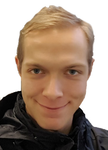Sascha Lill
 Kontakt / Contact Information
Kontakt / Contact Information
Sascha Lill
Universität Tübingen
Fachbereich Mathematik
AB Mathematische Physik
Auf der Morgenstelle 10
72076 Tübingen
Raum: C4 P42
Tel: +49 (0)7071 29 78448 (currently inactive)
E-Mail: sascha.lill@uni-tuebingen.de
Here is my CV.
Here is my arXiv list.
- From April 2021 through September 2021, I am at Cergy-Potnoise (France) for a research visit with Michal Wrochna
- From October 2021 through June 2022, I am it BCAM Bilbao (Spain) with Jean-Bernard Bru. See also my web site at BCAM
Wissenschaftliche Veröffentlichungen / Scientific Publications
- Another Proof of Born's Rule on Arbitrary Cauchy Surfaces (2021), preprint, arXiv: https://arxiv.org/abs/2104.13861
- Extended State Space for describing renormalized Fock spaces in QFT (2020), preprint, arXiv: https://arxiv.org/abs/2012.12608
- Consistency Proof for Multi-Time Schrödinger Equations with Particle Creation and Ultraviolet Cut-Off (2020), https://doi.org/10.1007/s00023-020-01009-w, arXiv: https://arxiv.org/abs/2001.05920
Lehre / Teaching
WiSe 2018/19:
- Übungsleiter / Tutor: Analysis 2 (bei Prof. Tumulka)
- Math Hour
SoSe 2019:
SoSe 2020:
- Übungsleiter / Tutor: Analysis 1 (bei Prof. Kröncke)
- Übungsleiter / Tutor: Lineare Algebra 1 (bei Prof. Tumulka)
WiSe 2020/21:
- Übungsleiter / Tutor: Geometrie (bei Prof. Paravicini)
Outreach
Link to the book project "Serlo", where I contributed in translating:
- Linear Algebra (under construction)
Originale Deutsche Version der Serlo-Bücher:
- Lineare Algebra 1 (in Bearbeitung)
175 Impulse Projekt der jDPG (junge Deutsche Physikalische Gesellschaft) - ein Gemeinschaftsprojekt, in denen einige der Zeichnungen von mir stammen.
Forschungsinteressen / Research Interests
- Mathematical methods in Quantum Field Theory (QFT)
- Mathematical methods in Quantum Optics
- perturbative and non-perturbative renormalization in QFT
- Detector modeling
- Multi-Time Wave functions
Forschung / Current Research
I am about to learn, where UV- and IR- divergences appear in QFT and Quantum Optics and how they can be circumvented.
I am currently investigating renormalization and time dynamics in different models for photon detectors (Absorbing Boundary Conditions and the Spin-Boson model).
I intend a comparison between the newly developed non-perturbative IBC-renormalization and the perturbative Epstein-Glaser renormalization.
